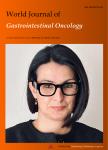Carcinoma of the stomach: A review of epidemiology, pathogenesis, molecular genetics and chemoprevention
Carcinoma of the stomach: A review of epidemiology, pathogenesis, molecular genetics and chemoprevention作者机构:Department of Biochemistry and Biotechnology Faculty of Science Annamalai University Annamalainagar-608 002 Tamil Nadu India
出 版 物:《World Journal of Gastrointestinal Oncology》 (世界胃肠肿瘤学杂志(英文版)(电子版))
年 卷 期:2012年第4卷第7期
页 面:156-169页
核心收录:
学科分类:1002[医学-临床医学] 100214[医学-肿瘤学] 10[医学]
基 金:Supported by A Grant from the Department of Biotechnology New Delhi India under the 7th FP of the Indo-EU Joint Collaborative Project on "FUNCFOOD"
主 题:Chemoprevention Diet Epidemiology Epigenetic changes Gastric cancer Genetic alterations Helicobacter pylori Risk factors
摘 要:Carcinoma of the stomach is still the second most common cause of cancer death worldwide, although the incidence and mortality have fallen dramatically over the last 50 years in many regions. The incidence of gastric cancer varies in different parts of the world and among various ethnic groups. Despite advances in diagnosis and treatment, the 5-year survival rate of stomach cancer is only 20 per cent. Stomach cancer can be classified into intestinal and diffuse types based on epidemiological and clinicopathological features. The etiology of gastric cancer is multifactorial and includes both dietary and nondietary factors. The major diet-related risk factors implicated in stomach cancer development include high content of nitrates and high salt intake. Accumulating evidence has implicated the role of Helicobacter pylori (H. pylori) infection in the pathogenesis of gastric cancer. The development of gastric cancer is a complex, multistep process involving multiple genetic and epigenetic alterations of oncogenes, tumor suppressor genes, DNA repair genes, cell cycle regulators, and signaling molecules. A plausible program for gastric cancer prevention involves intake of a balanced diet containing fruits and vegetables, improved sanitationand hygiene, screening and treatment of H. pylori infection, and follow-up of precancerous lesions. The fact that diet plays an important role in the etiology of gastric cancer offers scope for nutritional chemoprevention. Animal models have been extensively used to analyze the stepwise evolution of gastric carcinogenesis and to test dietary chemopreventive agents. Development of multitargeted preventive and therapeutic strategies for gastric cancer is a major challenge for the future.



